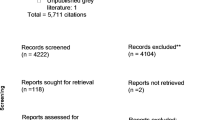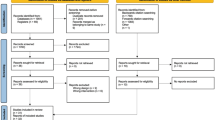Abstract
This paper examines midlife women's experiences of exercise and health promotion initiatives and the extent to which these contribute to health and well-being. Many attempts have been made to conceptualise well-being and construct ways of measuring it. An argument of this paper is that these conceptualizations have tended to be overly dominated by psychological and physiological concerns, leading to a neglect of well-being as a socially located phenomenon. Further, understandings of well-being have come to be associated with individualistic notions of agency that emphasize the self as the primary agent of personal well-being. This is evident in recent initiatives that seek to promote participation in exercise regimes as key ingredients of health and well-being. Drawing on qualitative research with Pakistani, British Muslim, white English, British, African Caribbean, black, and West Indian women, the aims of this paper are three-fold. First, to examine current perspectives on well-being and their relationship to individualized notions of responsibility for health. Second, to consider the extent to which health promotion advice empowers midlife women and contributes toward their health and well-being. Third, to question how these initiatives are perceived and experienced by women across ethnic diversity.
Similar content being viewed by others
References
Armstrong D (1995). The rise of surveillance medicine. Sociology of Health and Illness 17: 393–404.
Bartky SL (1998). Foucault, femininity and the modernization of patriarchal power. In: Weitz R (ed). The Politics of Women's Bodies: Sexuality, Appearance and Behaviour. Polity Press: London.
Bauman Z (1996). From pilgrim to tourist – or a short history of identity. In: Hall S, Du Gay P (eds). Questions of Cultural Identity. Sage: London.
Biggs S (1997). Choosing not to be old? Masks, bodies and identity management in later life. Ageing and Society 17: 553–570.
Biggs S (1999). The Mature Imagination: Dynamics of Identity in Midlife and Beyond. Open University Press: Buckingham.
Biggs S (2003). Age, gender, narratives, and masquerades. Journal of Aging Studies 18: 45–58.
Blakemore K, Boneham M (1994). Age, Race and Ethnicity. Open University Press: Buckingham.
Bordo S (1995). Unbearable Weight: Feminism, Western Culture, and the Body. University of California Press: London.
Brace-Govan J (2002). Looking at bodywork: women and three physical activities. Journal of Sport & Social Issues 26: 403–420.
Brah A (1996). Cartographies of Diaspora: Contesting Identities. Routledge: London and New York.
Bunton R, Burrows R (1995). Consumption and health in the ‘epidemiological’ clinic of late modern medicine. In: Bunton R, Nettleton S, Burrows R (eds). The Sociology of Health Promotion: Critical Analyses of Consumption, Lifestyle and Risk. Routledge: London.
Bunton R, Nettleton S, Burrows R (eds) (1995). The Sociology of Health Promotion: Critical Analyses of Consumption, Lifestyle and Risk. Routledge: London.
Burns M, Gavey N (2004). ‘Healthy weight’ at what cost? ‘Bulimia’ and a discourse of weight control. Journal of Health Psychology 9: 549–565.
Crawford R (1980). Healthism and the medicalization of everyday life. International Journal of Health Services 10: 365–388.
Department of Health (2004). Choosing health: making healthy choices easier. UK Government Public Health White Paper, http://www.dh.gov.uk. Accessed May 2006.
Duncan M (1994). The politics of women's body images and practices: foucault, the panopticon, and shape magazine. Journal Of Sport and Social Issues 18: 48–65.
Featherstone M (1995). Post-bodies, ageing and virtual reality. In: Featherstone M, Wernick A (eds). Images of Ageing: Cultural Representations of Later Life. Routledge: London.
Featherstone M, Hepworth M (1996). The midlifestyle of ‘George and Lynne’: notes on a popular strip. In: Featherstone M, Hepworth M, Turner B (eds). The Body: Social Process and Cultural theory. Sage: London.
Foucault M (1977). Discipline and Punish: The Birth of the Prison. Penguin: London.
Foucault M (1981). The History of Sexuality, Volume One. Penguin: London.
Foucault M (1984). On the genealogy of ethics: an overview of work in progress. In: Rainbow P (ed). The Foucault Reader. An Introduction To Foucault's Thought. Penguin: London.
Foucault M (1988). Truth, power, self: an interview with Michel Foucault. In: Martin L, Gutman H, Hutton P (eds). Technologies of the Self: A Seminar with Michel Foucault. Tavistock: London.
Fox N (1998). Foucault, foucauldians and sociology. The British Journal of Sociology 49: 415–433.
Frankenberg R (1993). The Social Construction Of Whiteness: White Women Race Matters. Routledge: London.
Furedi F (2004). Therapy Culture: Cultivating Uncertainty in an Uncertain Age. Routledge: London.
Giddens A (1991). The Consequences of Modernity. Polity Press: Cambridge.
Grogan S (1999). Understanding Body Dissatisfaction in Men, Women and Children. Routledge: London.
Grogan S, Evans R, Wright S, Hunter G (2004). Femininity and muscularity: accounts of seven women body builders. Journal of Gender Studies 13: 49–61.
Hepworth M, Featherstone M (1982). Surviving Middle Age. Blackwell: Oxford.
Karlsen S, Nazroo JY (2002). Agency and structure: the impact of ethnic identity and racism on the health of ethnic minority people. Sociology of Health and Illness 24: 1–20.
Keyes CLM (2002). The exchange of emotional support with age and its relationship with emotional well-being by age. Journal of Gerontology: Psychological Sciences 57: 518–525.
Litwin H (1996). The Social Networks of Older People: A Cross-National Analysis. Praeger: Westport.
Litwin H, Shiovitz-Ezra S (2006). The association between activity and wellbeing in later life: what really matters? Ageing & Society 26: 225–242.
Macdonald M (1995). Representing Women: Myths of Femininity in the Popular Media. Arnold: London.
Maguire J, Mansfield L (1998). No-body's perfect: women, aerobics, and the body beautiful. Socialogy of Sport Journal 15: 109–137.
Markula P (1995). Firm but shapely, fit but sexy, strong but thin: the postmodern aerobicizing female bodies. Sociology of Sport Journal 12: 424–453.
Markula P (2001). Beyond the perfect body: women's body image distortion in fitness magazine discourse. Journal of Sport & Social Issues 25: 158–179.
Markula P (2003). The technologies of the self: sport, feminism, and Foucault. Sociology of Sport Journal 20: 87–107.
Markula P (2006). Deleuze and the body without organs: disreading the fit feminine identity. Journal of Sport & Social issues 30: 29–44.
Mason J (1996). Qualitative Researching. Sage: London.
Maynard M (1994). Methods, practice and epistemology: the debate about feminism and research. In: Maynard M, Purvis J (eds). Researching Women's Lives from a Feminist Perspective. Taylor & Francis: London.
National Institute for Clinical Excellence (NICE). (2006). http://www.nice.org.uk/ Accessed: May 2006.
Niebor A, Lindenberg S, Boomsma A, Van. Bruggen AC (2005). Dimensions of well-being and their measurement: the SPF-Il scale. Social Indicators Research 73: 313–353.
Orbach S (1979). Fat is a Feminist issue: The Anti-Diet Guide to Permanent Weight Loss. Arrow Books: London.
Paquette M-C, Raine K (2004). Sociocultural context of women's body image. Social Science & Medicine 59: 1047–1058.
Peterson A, Lupton D (1996). The New Public Health: Health and Self in the Age of Risk. Sage: London.
Reinharz S (1997). Who am I? The need for a variety of selves in the field. In: Hertz R (ed). Reflexivity and Voice. Sage Publications: London.
Rich E, Evans J (2005). ‘Fat ethics’ – the obesity discourse and body politics. Social Theory & Health 3: 341–358.
Rose N (1999). Powers of Freedom: Reframing Political Thought. Cambridge University Press: Cambridge.
Seidler VJ (1994). Recovering the Self: Morality and Social Theory. Routledge: London.
Sointu E (2005). The rise of an ideal: tracing changing discourses of wellbeing. The Sociological Review 53: 255–274.
Sontag S (1978). The double standard of ageing. In: Carver V, Liddiard P (eds). An Ageing Population. Open University Press: Milton Keynes.
St Martin L, Gavey N (1996). Women's bodybuilding: feminist resistance and/or femininity's recuperation? Body & Society 2: 45–57.
Thurston M, Green K (2004). Adherence to exercise in later life: how can exercise on prescription programmes be made more effective? Health Promotion International 19: 379–387.
Walker A (1999). The Politics of Old Age in Europe. Open University Press: Milton Keynes.
Weitz R (ed) (1998). The history of women's bodies. The Politics of Women's Bodies. Oxford University press: Oxford/Newyork.
Wheatley EE (2005). Disciplining bodies at risk: cardiac rehabilitation and the medicalization of fitness. Journal of Sport & Social Issues 29: 198–221.
Williams SJ (2003). Medicine & the Body. Sage: London.
Wolf N (1991). The Beauty Myth: How Images of Beauty Are Used Against Women. Vintage: London.
Wray S (2002). Connecting ethnicity, gender and physicality: Muslim Pakistani women, physical activity and health. In: Scraton S, Flintoff A (eds). Gender and Sport: A Reader. Routledge: London.
Wray S (2004). What constitutes agency and empowerment for women in later life? The Sociological Review 52: 22–38.
Zola IK (1972). Medicine as an institution of social control. The Sociological Review 20: 487–504.
Author information
Authors and Affiliations
Corresponding author
Rights and permissions
About this article
Cite this article
Wray, S. Health, Exercise, and Well-Being: The Experiences of Midlife Women from Diverse Ethnic Backgrounds. Soc Theory Health 5, 126–144 (2007). https://doi.org/10.1057/palgrave.sth.8700100
Published:
Issue Date:
DOI: https://doi.org/10.1057/palgrave.sth.8700100




